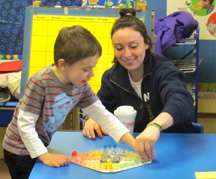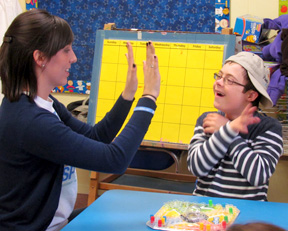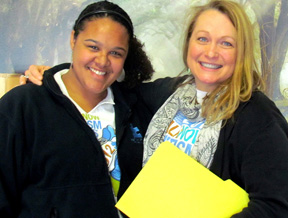Respite program aids children with autism and their parents
Local church and two colleges work together on unique program
by Doug Hickerson
 Luke and Clarice work on taking turns in the table games activity room. Every Sunday morning, while giving his sermon, Pastor Tom Stroup saw two families sitting behind the glass walls in the church lobby. He knew the parents had children with autism who needed special attention. Tami Sullivan was a member of his Brockport Free Methodist Church and an adjunct professor of psychology at the College at Brockport. Stroup asked her what support could be provided for these families so the parents could come into the service. Sullivan was advisor to a psychology major, Jordyn Bree, in the honors college. Bree needed a capstone project for her senior year; she was interested in how parents with autistic children have opportunities for respite. With Sullivan supervising, Bree started the autism respite program on Sundays at the Brockport Free Methodist Church. The two families were the first to sign up.
Luke and Clarice work on taking turns in the table games activity room. Every Sunday morning, while giving his sermon, Pastor Tom Stroup saw two families sitting behind the glass walls in the church lobby. He knew the parents had children with autism who needed special attention. Tami Sullivan was a member of his Brockport Free Methodist Church and an adjunct professor of psychology at the College at Brockport. Stroup asked her what support could be provided for these families so the parents could come into the service. Sullivan was advisor to a psychology major, Jordyn Bree, in the honors college. Bree needed a capstone project for her senior year; she was interested in how parents with autistic children have opportunities for respite. With Sullivan supervising, Bree started the autism respite program on Sundays at the Brockport Free Methodist Church. The two families were the first to sign up.
That was five years ago. Since then, the program has grown to include around 20 children from ages 4 to 17 attending each Sunday.
Sullivan is now Dr. Tami Sullivan, with a Ph.D. from the University of Rochester in counseling and counselor education. She is an assistant professor of psychology at Roberts Wesleyan College. Sullivan continues to direct the church project as part of the umbrella F.A.C.T.S. program at Roberts, standing for “Family Autism Community Together in Supports.” She provides educational and psychological consultation and research programs from F.A.C.T.S., looking at the quality of life for families with children on the autistic spectrum. “I try to be responsive to community needs, what’s going on,” she says.
April is Autism Awareness Month
 Valerie and Troy high five after achieving a social skills objective.The American Academy of Pediatrics has identified autism as the fastest growing developmental disability. The glass wall scenario in the church is symbolic of families with autistic children being partly excluded from the larger society by misperceptions and lack of opportunities for the children to function socially. Dr. Sullivan’s dedication and extensive outreach aims to educate leaders in schools and in community programs through her F.A.C.T.S. program. “Our goal is to find new solutions to how family needs can be met through collaboration with community partners,” she says. She has partnered with her church for the respite program, serving parents and the autistic children. From Roberts Wesleyan she has connected with the College at Brockport, engaging about 35 student volunteers to work with the children. Through the training and service, the college students develop their own personal skills and attitudes.
Valerie and Troy high five after achieving a social skills objective.The American Academy of Pediatrics has identified autism as the fastest growing developmental disability. The glass wall scenario in the church is symbolic of families with autistic children being partly excluded from the larger society by misperceptions and lack of opportunities for the children to function socially. Dr. Sullivan’s dedication and extensive outreach aims to educate leaders in schools and in community programs through her F.A.C.T.S. program. “Our goal is to find new solutions to how family needs can be met through collaboration with community partners,” she says. She has partnered with her church for the respite program, serving parents and the autistic children. From Roberts Wesleyan she has connected with the College at Brockport, engaging about 35 student volunteers to work with the children. Through the training and service, the college students develop their own personal skills and attitudes.
Respite program at the Brockport Free Methodist Church
The respite program runs from 11 a.m. to 1 p.m. every Sunday at the church, 6787 Fourth Section Road. The spring semester started February 12 and goes through May 6. Once children are registered for the free program, the children participate in seven different activity stations: Music, Dance, Recreation and Leisure, Sensory Play, Adaptive Physical Education, Table Games, and LEGO® Social Skills Group. Each activity is planned to engage the children’s interest and build upon their unique skills, and is staffed by two or more trained student leaders. “The fun, hands-on activities encourage positive social interaction, communication, reciprocal play, and group interaction,” according to the program brochure.
Autism is now conceptualized as an autism spectrum disorder, presenting a variety of social, communication and behavioral impairments. Those seven activities in the respite program address the disabilities found on the autism spectrum, and range from high functioning to low functioning. “We customize our approach to each child, depending on where he or she fits on the spectrum,” Sullivan said, although they also rotate through all the activity centers to develop other skills. For purposes of the respite program, Sullivan said, “The child’s location on the spectrum is not found by clinical testing, but by talking with the parents who are really the experts in the children’s lives.”
College student participation
 Chelsea McCann (left) and Dr. Tami Sullivan enjoy working at the Autism Respite Program at Brockport Free Methodist Church. Chelsea is the student director and Tami is the supervisor.About 35 student volunteers come from the College at Brockport and Roberts Wesleyan College. They serve as activity directors at the seven activity stations as well as one-to-one aids with the children.
Chelsea McCann (left) and Dr. Tami Sullivan enjoy working at the Autism Respite Program at Brockport Free Methodist Church. Chelsea is the student director and Tami is the supervisor.About 35 student volunteers come from the College at Brockport and Roberts Wesleyan College. They serve as activity directors at the seven activity stations as well as one-to-one aids with the children.
Dr. Mark Noll, geology professor at Brockport, is an academic advisor and link between the respite program and the College’s Career Exploration Program which provides internships and academic credits. The students are primarily psychology majors, but some are in physical education, health science, elementary education, and dance. “All of the students are fantastic,” Noll said, citing “their dedication, their caring towards the kids, and their professionalism. They’re undergraduates and volunteers; that’s amazing to me.”
Some Roberts Wesleyan volunteers are undergraduate students in psychology. Others are graduate students in school counseling and school psychology, and have extensive training to facilitate the LEGO® social skills group for higher functioning children.
Chelsea McCann is a junior at the College at Brockport and the student director for the respite program. A major in psychology and health science, she recruits the student volunteers, interviews them, trains them, and schedules them. She began in the program as a freshman and served two years as an aid before her promotion to student director. She plans to attend graduate school to earn a Psy.D. degree in counseling psychology. “This position has taught me lots of patience, as well as passion for people as human beings,” McCann said. “Everyone is different and we have to be accepting of people as individuals whoever they are.”
Sullivan says McCann excels academically, interpersonally and in her advocacy skills. “That’s what is so important to me, to see the passion that develops with these college students,” Sullivan said. “Not only understanding what it’s like working with children on the autism spectrum, but also becoming passionate enough about the work that they will continue into graduate school.”
Beyond the respite program
The oldest youngsters in the respite program are 17. A concern of most parents is what happens when their children become adults and want to go on to post-secondary options in the world of work, Sullivan observed. She noted the increasing attention to students on the autism spectrum on college campuses. Many different college partnerships and collaborations now provide alternatives to lower functioning students who need support. The Center for Innovative Transition at the University of Rochester helps lower functioning students with a campus-based college pilot experience certificate program, including relational and living skills. At Roberts Wesleyan, Sullivan says, “The BELL program (Bridge to Earning, Learning and Living) is a partnership with CP Rochester and BOCES 2 where transition students between 18 and 25 have academic advisors, peer mentors, job training specialists to help with earning, learning, and living.”
Whether it’s the respite program at her church, or programs at her college, Sullivan says, “The bottom line, the objective for us (at F.A.C.T.S.) is partnering with families and using their expertise to inform our practice.”



